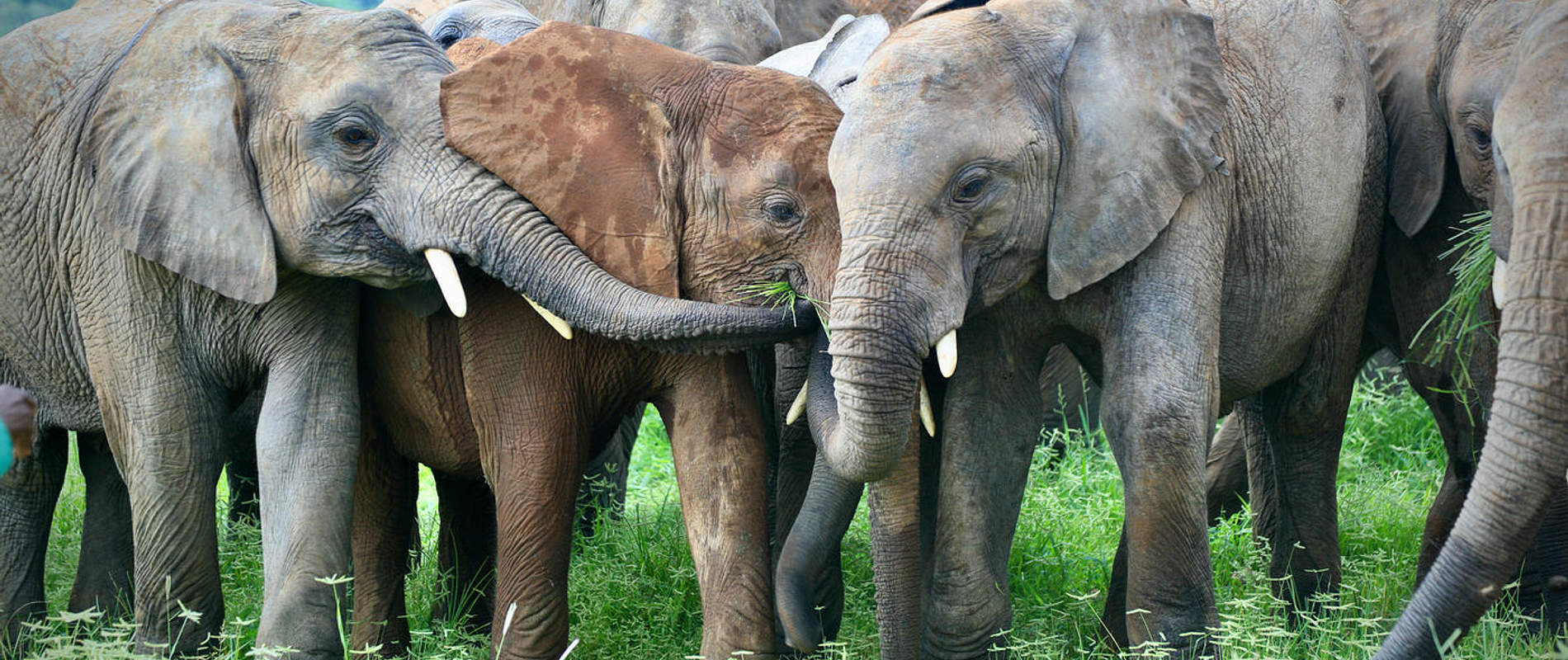After months of practice, the conditions finally aligned for Ahmed, Tingai, and Taabu to take the next step in their reintegration journey.
We had anticipated this move for quite some time. In recent months, Ahmed, Tingai, and Taabu had exhibited all the telltale signs that they were ready to graduate from the Nursery: forgetting their manners, pushing their weight around, splitting off from the wider Nursery herd, and generally acting like petulant adolescents. Even Taabu, who usually has impeccable manners, had started becoming a menace during the public visit, sneaking his big body beneath the rope cordon just to enjoy the reaction it elicited!
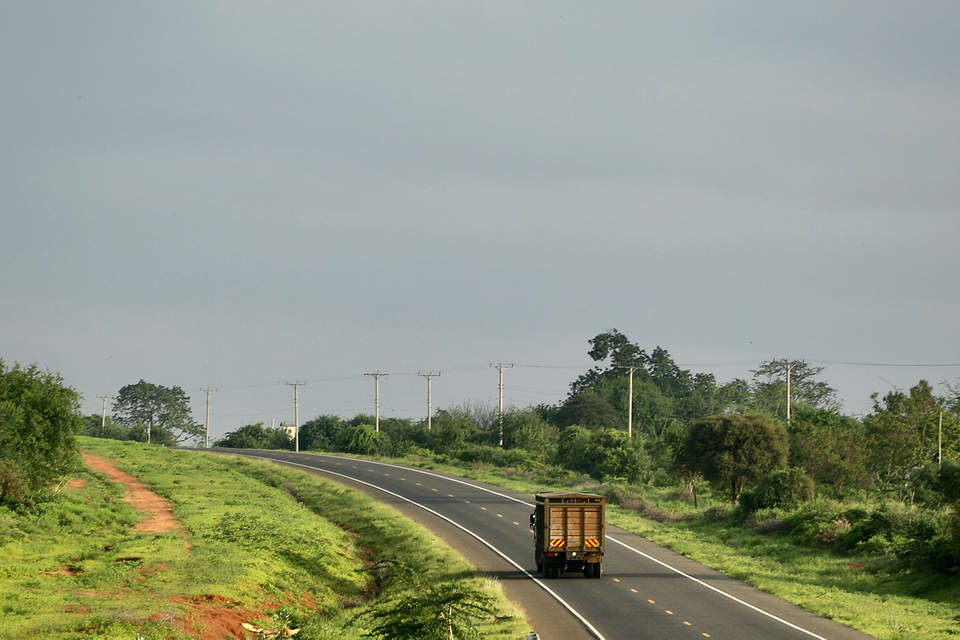
The graduates on their green journey to Tsavo
At 2:30 in the morning on 6th December 2023, the trio were loaded onto the moving lorry. Tingai was loaded first, followed by Taabu. Ahmed, the sole girl of the group, needed quite a bit of coaxing to enter her compartment. She had always been amenable during training sessions, but she seemed to intuit that this wasn’t a dress rehearsal. They were accompanied by Peter and Galgallo, two of their Nursery Keepers.
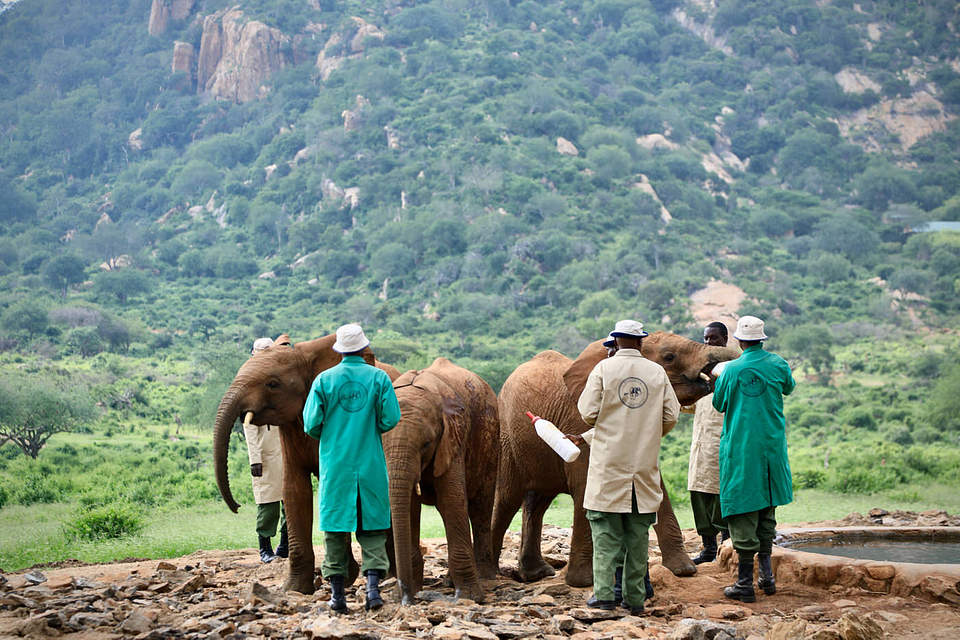
Ahmed, Tingai, and Taabu have their first milk bottle in their new home
After an uneventful journey, the graduates and their convoy exited the Mombasa Highway and slowly made their way up the red earth road that winds through the northern sector of Tsavo East. It was an atmospheric morning, with mist clinging to the tops of all the hilltops. At Ithumba, everyone was waiting in position to greet the new arrivals.
Upon arriving in Ithumba, Taabu was the first to emerge from his compartment. He finished his bottle in a leisurely manner… then about-turned and strolled back into the moving lorry, perhaps wondering if another bottle might be waiting within! Ahmed and Tingai were a bit more on edge, but the presence of their Nursery Keepers put them at ease.
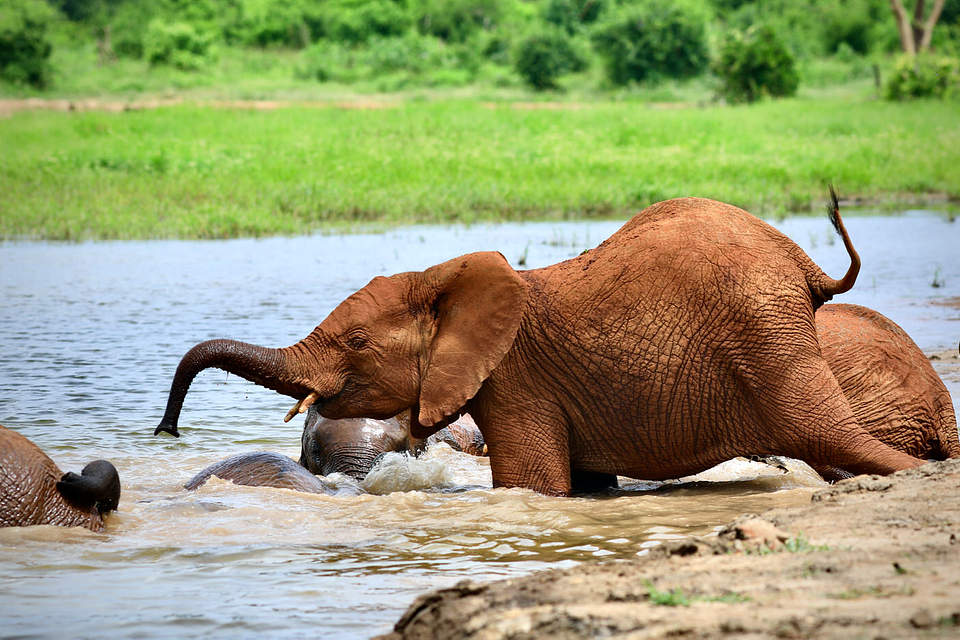
Ahmed immediately took charge and dove into Ithumba life — quite literally!
After all bottles were finished, the Keepers led Ahmed, Tingai, and Taabu down to the water trough. Right on cue, Naleku, Bondeni, Kindani, andi Kinyei — who know the trio from their shared Nursery days — dashed in to greet them. This has an instant calming effect on the graduates. They were delighted to be reunited with their old friends, and lots of happy rumbling and trunk hugs ensued.
And then, the herd descended. Our plan was to bring the Ithumba orphans over in manageable groups, so as to not overwhelm the graduates, but they had other plans! This was the first graduation in more than six months, and the excitement was palpable. The entire orphan herd jumped the queue and arrived in a delightful barrage.
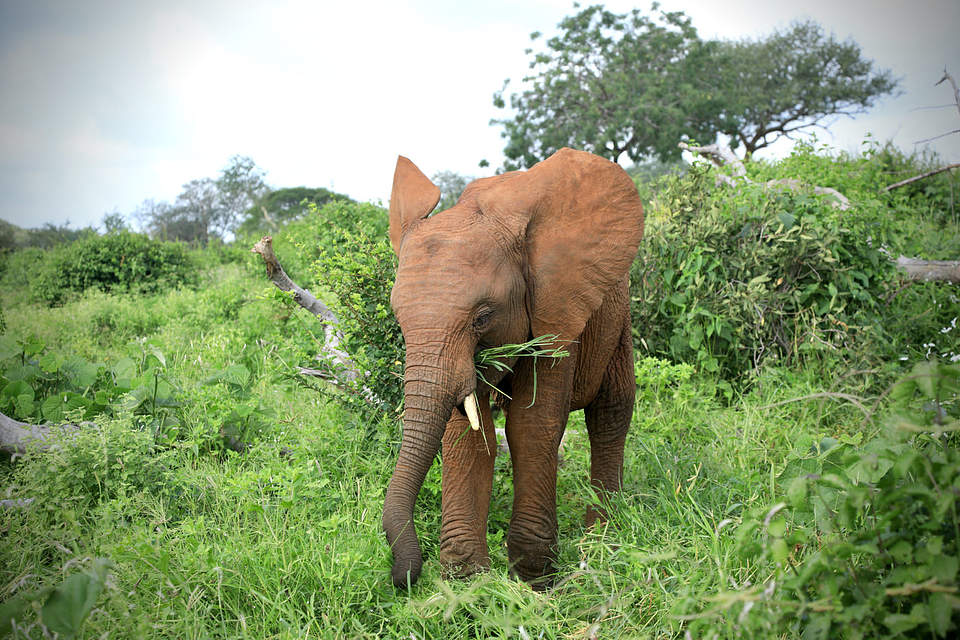
Tingai was delighted by the bounty of green in Ithumba
Taabu instantly became the most popular elephant in Tsavo (Naleku, who was his original neighbour at the Nursery, was keen to ‘claim’ him), while Tingai and Ahmed caught up with friends old and new. Greetings out of the way, everyone slowly made their way down to the mud bath.
The trio were overwhelmed by Ithumba’s massive pool, which must seem like a lake compared to the Nursery’s puddle, but a little encouragement from Olorien coaxed them into the water. A relaxed afternoon in the bush followed, as everyone enjoyed the bounty of green in Ithumba. As dusk fell, Ahmed, Tingai, and Taabu were shown into ‘Class One,’ the stockade that will be their new bedroom.
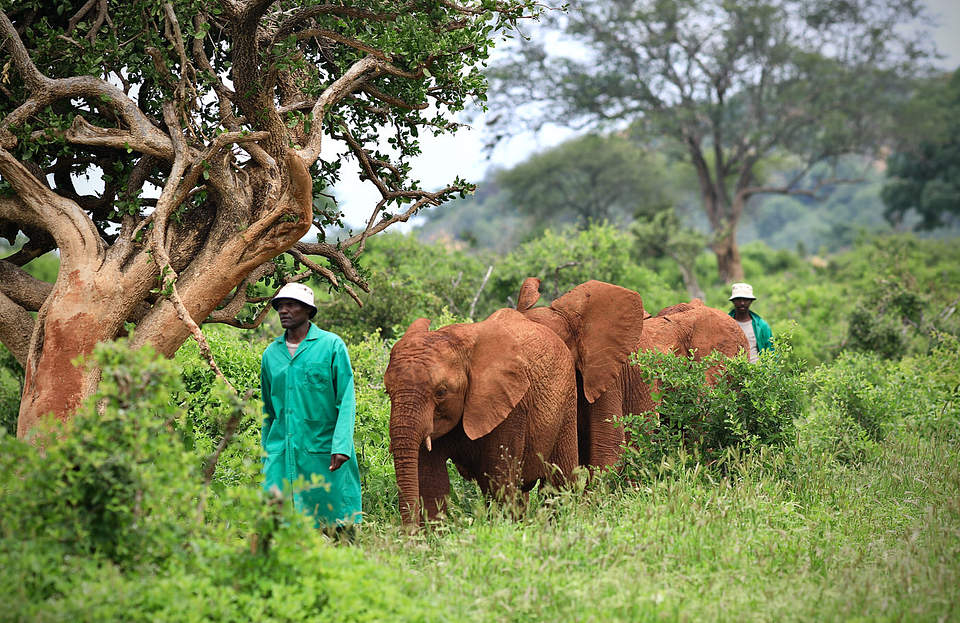
Showing such confidence, Taabu led the herd down to the mud bath
For two of our graduates, this move marked a homecoming:
Taabu was rescued from the Tsavo ecosystem during the 2021 drought. For 24 hours, an abandoned 12-month-old calf had been observed outside Salt Lick Lodge. Like so many other orphans of the drought, he had been left behind when he couldn’t keep up with his herd. A rescue was organised, and Taabu was flown to our Nairobi Nursery. He was quite young when he was rescued, which is why older girls like Naleku immediately rallied around him. His inclusive, social personality instantly earned him friends young and old.
Ahmed was rescued from Tsavo West, under the most tragic circumstances. She was found standing guard over her mother’s body, helpless yet fiercely protective. (A post-mortem showed that Ahmed’s mother died of severe peritonitis. In a tragic twist to the story, it also revealed that she was heavily pregnant. She had carried her unborn baby nearly full-term, but neither survived this terrible accident.) Orphans who watched their mothers die typically suffer severe emotional trauma, and Ahmed was no different. She came to us withdrawn and mistrustful. But the Nursery herd worked their healing magic, as they always do, and shy Ahmed started to open up.
Tingai, the outlier, was rescued from Isiolo County. His mother was killed in human-wildlife conflict, and he was located five days later, frightened and bearing a spear injury. At the Nursery, we could always rely upon Tingai to keep the peace. He was gentle with the little ones, but stern with his age-mates. In recent months, however, he had become a bit short-tempered and unruly. Clearly, it was time for broadened horizons.

Ithumba is a veritable jungle right now — the graduates have landed in paradise!
By the second day, the trio were old hat — in fact, looking upon the orphan herd, it would be impossible to distinguish who the newbies were! Interestingly enough, Ahmed has emerged as the matriarch of her graduate group. Kitiak, Elerai, and Rafiki arrived from the Nursery just two days later (that story will be told soon), and she immediately assumed leadership of both teams. This is a win-win for everyone, as she enjoys the opportunity to take charge, and the boys need someone to look up to.
An Addendum:
On 10th December, our graduates’ story took an unexpected twist: In the early morning some kudus leapt out of the underbrush, taking the orphan herd by surprise. Caught off guard, everyone took off in different directions. When the Keepers called, the orphans slowly filtered back — all but Ahmed, Tingai, Taabu, Kitiak, Elerai, and Rafiki, who did not return.
A team of Keepers immediately began to search for them, calling for them all the while and searching for their tracks in the mud. Tracking them was a difficult task: Ithumba is a green, tangled jungle after spectacular rains, and while the elephants moved easily through the landscape, it was significantly harder going for the humans attempting to follow them.
At first, the Keepers weren’t overly panicked and felt sure everything was in hand. But then, the tracks indicated that the six were covering ground and moving away from the rest of the herd. The SWT helicopter and fixed-wing aircraft were mobilised to the scene. They flew transects for the rest of the afternoon, painstakingly crisscrossing the area the Keepers felt sure they had gone. Ithumba and the northern area of Tsavo has quite literally thousands of elephants at present, which makes this a challenging undertaking.
By nightfall, despite a combined 12 hours of flying and extensive ground searching, the babies still hadn’t been located. The Keepers, particularly Ithumba Head Keeper Benjamin, are extremely stressed by these events, feeling responsible for losing the babies. Our Keepers walked 30 kilometres on foot that day, searching for the missing orphans, but a late afternoon rainstorm erased the elephants’ tracks. At first light, the pilots resumed their search. Between now and then, they have logged more than 26 hours in the aerial search.
While an aerial perspective offers obvious advantages in this sort of mission, tracking conditions are incredibly challenging at the moment. Ithumba has turned into a profusion of thick vegetation, capable of shrouding even the biggest bull. This sector of the park is also teeming with elephants right now, making it very difficult to differentiate our little sextet from the hundreds in the area.
As yet, we have not located our six graduates. While we are very anxious for them to come home, we feel optimistic that they are faring well. Conditions are extremely favourable conditions right now, with a bounty of food and water at every turn. There are also lots of ex-orphans and wild herds in the area, who will no doubt welcome our little group into their midst. And we feel very heartened by the knowledge that they have a confident, capable leader in Ahmed, the only female of the group.
Finally, we are mindful that Ahmed, Kitiak, Elerai, and Rafiki were all living wild for longer than they were in our care. They have strong wild instincts and were always very self-sufficient, even at the Nursery. Taabu and Tingai were rescued a bit younger, but they have grown into two very assured, independent bulls. We know that their friends — and, if our suspicions are correct, the ex-orphans and wild friends they collect along the way — will look after them.
We feel certain that this story isn’t over yet. We will share updates as and when we have them — but in the meantime, it's important to reassure ourselves that elephants look after each other in such favourable times, food and water are bountiful, and all six are very self-reliant, competent individuals. More to come!
